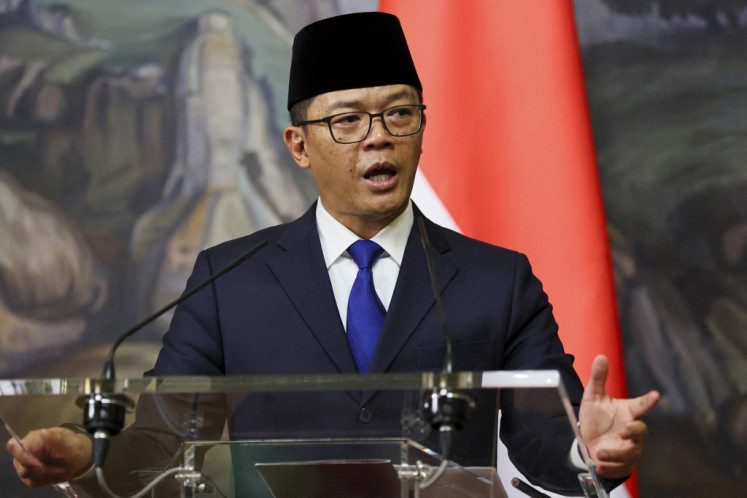Popular Reads
Top Results
Can't find what you're looking for?
View all search resultsPopular Reads
Top Results
Can't find what you're looking for?
View all search resultsRI rejects offer to send 10,000 more haj pilgrims
Religious Affairs Ministry cites time constraints in rejecting proposal from Saudi.
Change text size
Gift Premium Articles
to Anyone

T
he government has declined an offer from the Saudi Arabian authorities to send an additional 10,000 Indonesians on the holy pilgrimage this year, citing time constraints.
Following eased COVID-19 restrictions, the government announced earlier this year that Indonesia would be sending some 100,000 pilgrims to go on haj, after two years of health and mobility restrictions that barred potential pilgrims from doing so.
Read also: Govt to send 100,051 pilgrims on haj this year
The first batch of Indonesians, consisting of a few thousand pilgrims from Central Java, East Java, Jakarta and West Java, arrived in Saudi Arabia last month, with thousands more to follow until July 3.
Read also: Thousands of Indonesians arrive in Saudi Arabia for haj
But this year’s quota has been less than half of what Indonesia – the world’s largest Muslim majority country – received usually, as around 220,000 Indonesians were set to go on haj in 2020, before the government’s annual program was canceled amid Saudi Arabia's previous suspension of the haj for international pilgrims due to the pandemic.
The Religious Affairs Ministry’s haj and umrah (minor haj) director general, Hilman Latief, said in a press statement on Wednesday that while the government had received an invitation to send 10,000 more pilgrims, it had elected to decline.
Hilman said the Religious Affairs Ministry had sent an official to the Saudi Arabian Haj and Umrah ministry, informing of Indonesia's decision to not send any more pilgrims due to time constraints.
“They understand the conditions and systems that apply in Indonesia. They understand [Indonesia’s] quota system, serial numbers and other [provisions]. Haj pilgrims must be carried out based on the applicable regulations," Hilman said.
As Indonesia received the letter of invitation only on June 21, Hilman said that the government could not keep up with the deadline of flying the last batches of pilgrims on July 3, since the deadline for visa applications fell on June 29.
In addition, Hilman said that the government would need to conduct a meeting with the House of Representatives Commission VIII, which oversees social affairs, to determine any additional quota and its financing scheme. The meeting’s decision would need to be followed by the issuance of a presidential and ministerial decree for the additional quota.
The government would also need to verify the data and documents of hopeful pilgrims, while at the same time allocating enough time for the pilgrims to pay their haj fees, which had previously been set at just below Rp 39 million (US$ 2,604.31) per pilgrim for the first 100,000 pilgrims.
Indonesia had previously been able to send an additional 10,000 pilgrims for the 2019 haj season, with the government receiving the invitation three months before the first batches of pilgrims were due to depart.
“Hopefully we can use this additional quota in the upcoming haj season, it would be even better if there is even more [quota for Indonesian pilgrims]. However, we need to ensure from the start that there is enough time to prepare,” he said.
As of Wednesday, 78,339 Indonesians had already embarked on their pilgrimage to Saudi Arabia.
The haj is one of the five pillars of Islam and performing it at least once is an obligation for all physically and financially able Muslims. For many Indonesian Muslims, the haj is a once-in-a-lifetime occasion, one they could wait up to 20 years for due to the way Saudi Arabia regulates its quota.
Saudi authorities have set a requirement for all Indonesian pilgrims to be fully vaccinated and to present a negative polymerase chain reaction (PCR) test, taken at most three days before their departure.
Additionally, Indonesia’s Health Ministry has taken its own precautions, including preparing a total of 3,000 electronic wristbands that can monitor their wearer’s health condition. The ministry has also set up a number of health clinics for its pilgrims in Jeddah, Mecca and Medina.
In spite of this, 14 Indonesians have died during their pilgrimage as of Monday, with a further 87 people being ill.









